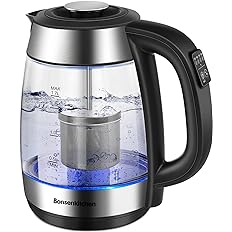I an conscious of energy efficiency... My power company just advised me that last month I used 14% less power than my energy efficient neighbors (thanks to my kick ass mitsubishi heat pump).
Today I am talking about my new hot water electric coffee kettle. They make high tech electric kettles with temperature regulation. Water heated to only 195'F or so, just shy of boiling, makes better tasting coffee.
The energy saving win-win is that it takes a bunch of extra energy to make hot water boil. The classic relationship for heating water is that it takes one calorie of heat energy per gram of water to increase the temperature 1 degree C (below boiling). But to heat that 1 G of hot water at 100C to boiling (water vapor) takes an additional 540 calories per gram.
A regulated kettle that stops heating the water just short of boiling, will also save a bunch of energy.
JR
PS: I don't know if this would save the planet, but it should make better coffee.
Today I am talking about my new hot water electric coffee kettle. They make high tech electric kettles with temperature regulation. Water heated to only 195'F or so, just shy of boiling, makes better tasting coffee.
The energy saving win-win is that it takes a bunch of extra energy to make hot water boil. The classic relationship for heating water is that it takes one calorie of heat energy per gram of water to increase the temperature 1 degree C (below boiling). But to heat that 1 G of hot water at 100C to boiling (water vapor) takes an additional 540 calories per gram.
A regulated kettle that stops heating the water just short of boiling, will also save a bunch of energy.
JR
PS: I don't know if this would save the planet, but it should make better coffee.











![Electronics Soldering Iron Kit, [Upgraded] Soldering Iron 110V 90W LCD Digital Portable Soldering Kit 180-480℃(356-896℉), Welding Tool with ON/OFF Switch, Auto-sleep, Thermostatic Design](https://m.media-amazon.com/images/I/41gRDnlyfJS._SL500_.jpg)













